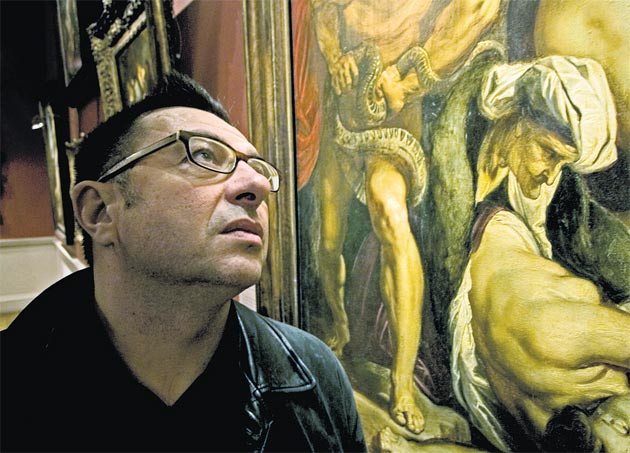Last Night's TV: Stuck to the cultural syllabus
Baroque! BBC4<br/>Debussy and Monet, BBC4<br/>Horne & Corden, BBC3<br/>Jade, LIVING TV

Your support helps us to tell the story
From reproductive rights to climate change to Big Tech, The Independent is on the ground when the story is developing. Whether it's investigating the financials of Elon Musk's pro-Trump PAC or producing our latest documentary, 'The A Word', which shines a light on the American women fighting for reproductive rights, we know how important it is to parse out the facts from the messaging.
At such a critical moment in US history, we need reporters on the ground. Your donation allows us to keep sending journalists to speak to both sides of the story.
The Independent is trusted by Americans across the entire political spectrum. And unlike many other quality news outlets, we choose not to lock Americans out of our reporting and analysis with paywalls. We believe quality journalism should be available to everyone, paid for by those who can afford it.
Your support makes all the difference.Old-school journalists used to call exclamation marks "dog's cocks", and Waldemar Januszczak has put one in the title of his new BBC4 show, Baroque!. In fact, there is an altogether canine emphasis in his style of delivery, which shifts from a low growl to a bark, mauling consonants along the way (he is a man who can put a "w" into "Naples"). He bites, too: he is good at the trenchant phrase which makes the viewer feel they are really learning something. This ceiling will tell you "everything you need to know" about Baroque; "understand Bernini and you understand Baroque", etc. This is just what you want to hear when you are time-poor, keen to improve yourself, and only half-interested.
Baroque! is, for all its punctuation, a traditional show that does not stray from the art history syllabus. It barely gives any sense of the meaning of "Baroque" as a sensibility, an adjective or even a musical movement; conceptually, it never tempts or tickles, or suggests connections with the present. It is educational in the sense of feeding in, not leading out. Visually, it runs around the canvasses like a pitbull off the lead, which for a programme about art is a problem.
Art lets us decide how long it deserves our attention; music makes that call for us. "With music, we are experiencing time... We are locked into it," as conductor David Robertson explained in Debussy and Monet. It was only a film of a concert at the Barbican, and the quality of the footage – a film of a slide of a photograph of a Monet – was as poor as a mad fan tribute on YouTube. But the originality and freshness of the concept was enchanting, leading you to Monet's water and letting you think.
A quick defence of the new comedy show that is Horne & Corden. Overlook the shameless exploitation of the great natural resource of Corden's belly (homophobic? Maybe. Fattist? Definitely!) and the dud supermarket trolley sketch, and what do you have? Some astoundingly successful, exuberant clowning from Corden, and some neat deadpanning from Horne. They're callow but talented. Let's not put them on a critical see-saw between adoration and bile.
I took a deep breath and switched on the Living TV documentary Jade, following Jade Goody through terminal cancer. Over footage of her looking frail, the caption "Three days to go..." came up. My mother gasped in horror. They should have made it more immediately clear, perhaps, that the countdown was to Jade's wedding. There is something undeniably morbid about the intense television coverage of this woman's demise, and yet in many ways it is reassuring, too. At least we haven't pushed her away and pretended to forget about her; she has not been treated, as one journalist predicted, like "a broken toy". Her suffering demanded that we shift our understanding of her public role dramatically, from self-made joker to tragically young victim of an arbitrary disease. The genre of the play we thought we were watching has changed without warning. It was, for a short while, Pygmalion – now the media is in danger of turning it into something more like La Dame aux Camélias. It is neither: it is a real person's life. We were never watching a play at all, and Goody's illness is a punishing reminder of what we had forgotten, in our callous desire to treat her like a high-concept reality TV "character" – her human vulnerability.
Living TV has, to its credit, kept a firm hold of this idea. It neither demeans nor glamorises. It treads carefully, seeming to remember that it is forming a legacy of memories for her sons, while simultaneously managing to raise public awareness and demystify cancer. "Raising awareness" often means charities using the softest of soft strategies: pink powder compacts that signify five pence has gone to breast cancer support and the like. This is where we get real. The programme shows the awful reality of her constant need for painkillers, though it is a pity that it fights shy of words like "catheter" and "morphine". This is the stuff no one tells you until it's happening to someone you love. The tone of the programme is strange. One moment there is bawdy comedy, with Jack Tweed and his friends showing their bottoms, spontaneously, to the paparazzi; the next there are frenzied beauty treatments, with her bridesmaids; the next, silence and tears. This is what happens in "real" tragedies, by which I mean invented ones. Cleopatra, surrounded by handmaidens, buys her asp from a fool, a bawdy clown. I did not mean to recourse to theatrical comparisons when this is about facing up to documentary TV truth, but after all, "Human kind/ Cannot bear very much reality".
Join our commenting forum
Join thought-provoking conversations, follow other Independent readers and see their replies
Comments